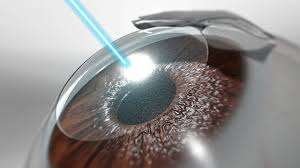Understanding LASIK Eligibility Criteria: Who Qualifies for Laser Eye Surgery?

LASIK surgery has revolutionized the field of ophthalmology, offering millions of people worldwide the opportunity to achieve clearer vision and reduce their dependence on glasses or contact lenses. However, not everyone is a suitable candidate for this procedure. Understanding the eligibility criteria and the tests used to determine candidacy is essential for individuals considering LASIK surgery.
LASIK surgery is primarily recommended for individuals who meet certain criteria and have stable vision for a specified period. While specific eligibility requirements may vary depending on individual factors and the recommendations of the surgeon, there are several general guidelines that can help determine whether someone is a suitable candidate for LASIK:
Age: While there is no strict age limit for LASIK surgery, most surgeons prefer to perform the procedure on individuals who are at least 18 years old and have stable vision for at least one year. Younger patients may experience fluctuations in their vision as their eyes continue to develop, making them less suitable candidates for LASIK.
Vision Prescription: LASIK surgery is typically recommended for individuals with mild to moderate refractive errors, including nearsightedness (myopia), farsightedness (hyperopia), and astigmatism. Patients with severe refractive errors may not achieve satisfactory results from LASIK and may require alternative treatments.
Corneal Thickness: Adequate corneal thickness is essential for the safety and effectiveness of LASIK surgery. A comprehensive eye examination, including measurements of corneal thickness using techniques such as pachymetry, is conducted to assess suitability for the procedure. Thin corneas may increase the risk of complications during LASIK surgery.
Corneal Shape: The shape and curvature of the cornea play a crucial role in determining eligibility for LASIK surgery. Conditions such as keratoconus, irregular astigmatism, and corneal scarring may disqualify individuals from undergoing LASIK due to the risk of complications.
Eye Health: Good overall eye health is essential for LASIK candidacy. Individuals with eye conditions such as glaucoma, cataracts, severe dry eye syndrome, or retinal disorders may not be suitable candidates for LASIK. Additionally, individuals with certain systemic health conditions, such as autoimmune diseases or diabetes, may require further evaluation before undergoing LASIK surgery.
Before undergoing LASIK surgery, individuals are required to undergo a comprehensive eye examination and consultation with a qualified ophthalmologist or refractive surgeon. During this evaluation, several tests and assessments are performed to determine candidacy for LASIK:
Refraction Test: This test measures the refractive error of the eye, including nearsightedness, farsightedness, and astigmatism. Precise measurements are essential for determining the appropriate treatment plan for LASIK surgery.
Corneal Topography: Corneal topography provides detailed maps of the cornea’s shape and curvature, allowing surgeons to identify any irregularities or abnormalities that may affect LASIK candidacy.
Pupil Size Measurement: Pupil size plays a role in determining the optimal treatment zone for LASIK surgery. Individuals with larger pupil sizes may be at increased risk of experiencing symptoms such as glare or halos following LASIK surgery.
Tear Film Evaluation: Adequate tear production and a stable tear film are essential for maintaining ocular health and ensuring successful LASIK outcomes. Individuals with dry eye syndrome may require treatment before undergoing LASIK surgery.
Dilated Eye Examination: A dilated eye examination allows the surgeon to evaluate the overall health of the eye, including the retina, optic nerve, and other structures. Any abnormalities or signs of underlying eye conditions may affect LASIK eligibility.
By carefully assessing each patient’s individual characteristics and performing comprehensive diagnostic tests, refractive surgeons can determine whether LASIK surgery is a suitable option for achieving clearer vision. It’s essential for individuals considering LASIK to undergo a thorough evaluation and discuss their expectations, concerns, and treatment options with a qualified eye care professional. Ultimately, the decision to undergo LASIK surgery should be made collaboratively between the patient and their surgeon, taking into account all relevant factors to ensure the best possible outcomes.

